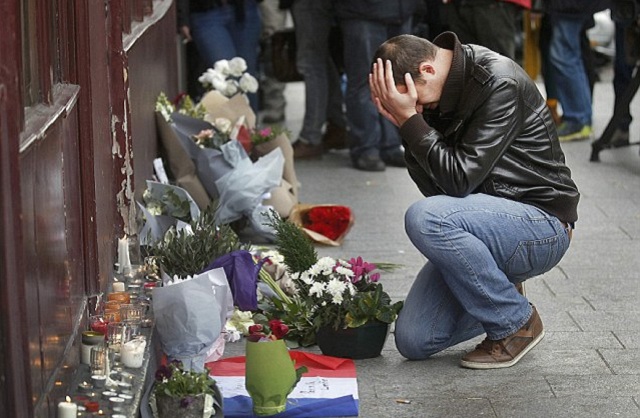SPECTRUM: Crisis of human rights in a ‘world in terror’


A mourner pays his last respects outside the Le Carillon restaurant the morning after a series of deadly attacks in Paris that killed at least 129
Joram Nyathi
WHAT else is there to write about concerning the Paris bombings a week later, from thousands of kilometres away in some tiny African country, after a week in which Western media made France the fulcrum of global security discourses, all in a bid to comprehend and contain the viral spread and danger of ISIS?
Let’s cut out the frills: that African lives matter far less than European lives, that deaths in Africa and the Middle East have long ceased to be tragedies but run of the mill tales to which the world has become inured, and that Europeans always have their global media at the ready when calamities strike, so we can share in their grief. In short, that tragedy is not always about the number of the dead but colour.
That leaves pretty little to write about, perhaps, that is if people obsess with the tragedy itself, the “psychopathic monsters” and their “poisonous ideology” and ignore the role of the West in the radicalisation of Muslim youth by trying to impose its worldview on other cultures.
That Friday the 13th catastrophe in which 129 youths lost their lives carries grim lessons; the reaction to it has debunked myths about the sanctity of civil rights and the smug self-righteousness of Western liberal democracy.
The reaction by Western leaders to the Paris massacre should help us see differently why their favoured brand of neoliberal democracy and theoretical versions of human rights are not guaranteed, are not universally applicable and how they need to be tempered by the practical realities in individual countries.
In short, the West has an opportunity to reflect on the applicability of the systems of governance they seek to impose on third world countries by removing sitting governments; whether such destabilisation serves the greater good of humanity, or even their own selfish desires for natural resources.
The failure of those experiments in Africa and the Middle East has provided a fertile breeding ground for the spread of fundamentalist ideologies whose bloody path we only had a glimpse of in Paris. Until last week, people watching the dark theatre playing in Africa and the Middle East, and eagerly welcomed desperate migrants who made it to shore.
That should be a sobering thought for the West which all along seemed to believe hot human blood could only be experienced by soldiers in faraway lands while their people indulged themselves in the safety of their capitals. More ominously, the killings in Paris last week tell us that most of the hallowed civil liberties in the West are under serious threat from within.
Threats of further attacks in Washington DC and other Western capitals can no longer be lightly dismissed without exposing more people to potentially fatal attacks. The shootings have come closer than the screen movies, in a way exposing civilians to a bloody backlash against what their governments are doing in other parts of the world. Internally, the heat of Islamophobia can only yield rabid jingoism and provide fodder for rightwing megalomaniacs across Western Europe and beyond.
Shock reaction
In our view, the biggest assault on the human rights front was not so much the carnage in Paris as the reaction it provoked among European leaders and its endorsement by their parliaments, especially of France and the United Kingdom.
President Francois Hollande of France called for a three months state of emergency, and told parliament France was at war. He immediately deployed 115,000 security personnel to deal with the emergency at home, and that’s not usually a tea party especially for civilians not accustomed to daily interaction with military men.
Britain’s David Cameron talked of ISIS’ “poisonous ideology” while America attacked ISIS as “psychopathic monsters”. Around 27 American governors quickly announced on Tuesday they would not take in Syrian refugees.
In a few short moments, the cold war “Iron Curtain” was up in Europe, but this time the noose is fastening on Westerners themselves, under siege from their own security personnel. Not in a long time have we witnessed so many armed men patrolling the streets of any European capital as we have seen in Paris this whole week, with civilians evidently terrified and confused. It is a world in terror more than it is at war.
Russia, which all along has been under attack by the same now hysterical European powers and the US, vowed revenge against ISIS for its downed plane in which all 224 onboard perished.
There is no doubt that it is Russia which has had to assume the role of responsible leadership in the fight against ISIS in a world otherwise dominated by warmongers led by America whose sole preoccupation is creating markets for their military hardware by fomenting strife and gaining access to cheap resources in the Middle East and Africa. In this club of the shameful despicable, America and France are proudly joined by Japan whose ubiquitous, rugged Toyota trucks have become a crowning feature of ISIS’s fighting equipment.
That legacy of shame has among its shining trophies Afghanistan, Iraq, South Sudan, Central African Republic, Cote d’Ivoire, Libya, Yemen and the latest efforts to decapitate Syria while training and arming rebel groups.
My biggest regret about the tragic war now underway in Syria and Iraq are the thousands of young lives being destroyed in their prime in a fight against a Frankenstein monster America created and nurtured in its senseless bid to impose its culture on the Arab world. We all have a duty to fight to protect what makes us a unique people, a nation.
There are other lessons. The war against ISIS will be won at a huge cost in human lives and cultural relationships. After it’s won, it is time Europeans took a stand and refuse to be dragooned into wars of aggression by the US. It is has lost honour to lead a peaceful world.
Second, European and American voters are beginning to pay a huge price for their governments’ misguided policies in the Middle East and Africa.
Those policies are bringing in response the massacres such as the one in Paris last Friday. That attack demonstrated that no nation is safe anymore and that superior military hardware and technology are no guarantee of security for the private citizen. They should therefore take a keen interest in their government’s foreign policies.
Third, the abridgment of individual civil liberties in the wake of the killings in Paris last week has demonstrated beyond doubt that there is nothing sacrosanct about liberal democracy and its human rights adumbration. Their applicability and respect are purely circumstantial, depending on what government determines to be in the best national interest at the time.
If the situation were otherwise, there should have been protests in European parliaments and beyond when their governments proposed tough measures in the fight against ISIS which seriously abridge individual human rights, that is restrictions on movement, random searches of suspects, as individuals and in homes, listening into private conversations and curbs on freedom of expression and association. Everybody knows as well as I do that journalists can’t write in defence of ISIS nor can anybody openly declare today that they are a member of ISIS.
The restrictions are acceptable because Europe is at war. Hasn’t Zimbabwe been at war for the better part of 17 years, most of them proxy wars sponsored by Britain and its allies? And even the Third Chimurenga to reclaim land was supposed to be won without casualties! Let’s witness the ISIS war without casualties in Europe – freedom of expression, freedom of association, freedom from state harassment, freedom of movement and personal privacy!










Comments